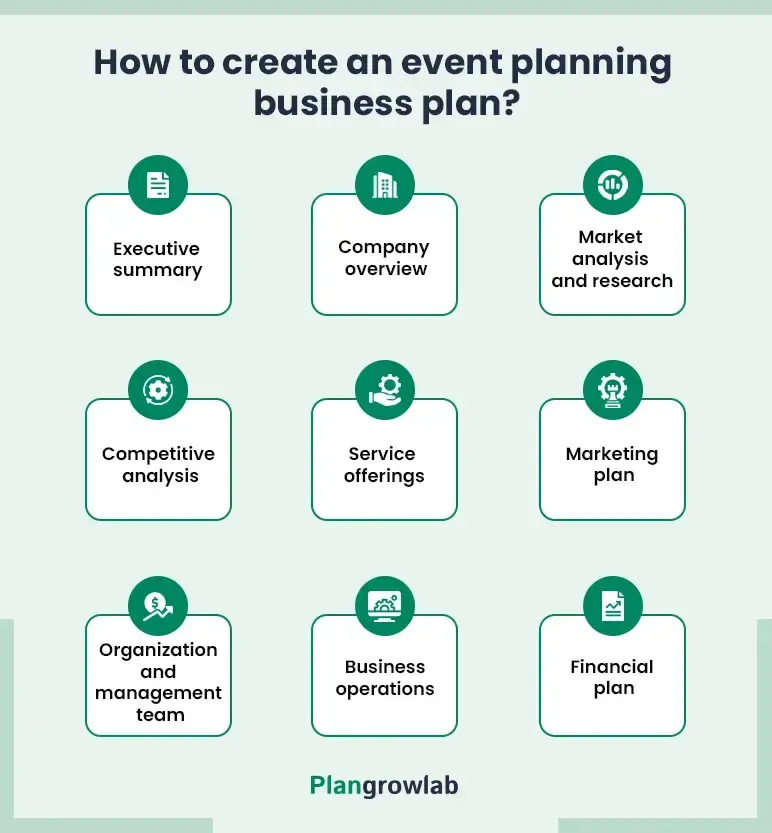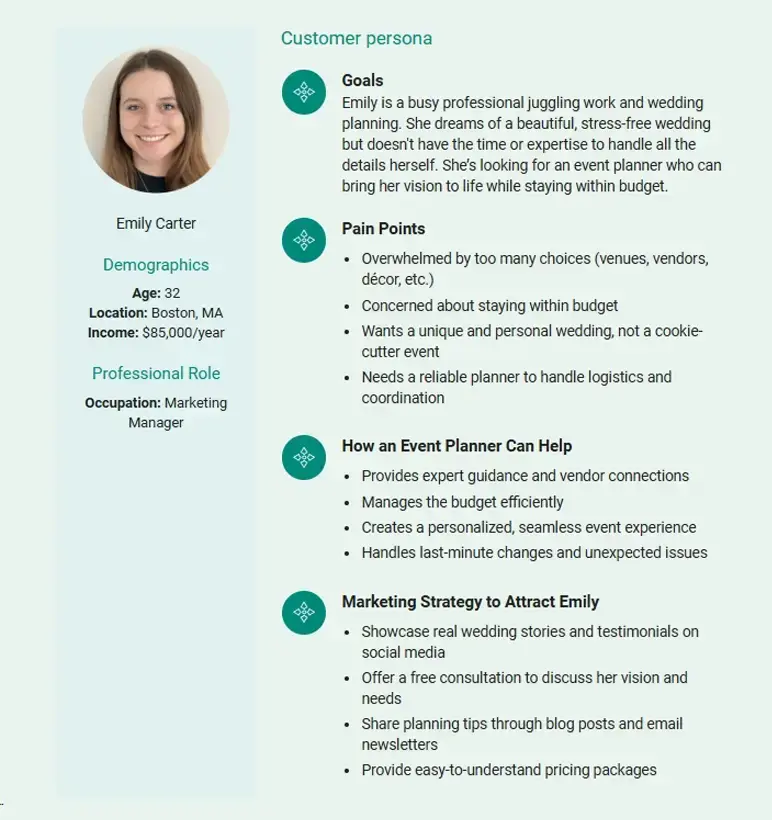Event planning is a creative and exciting field! But building a successful business around it takes more than just great ideas; it requires strategic planning and strong execution.
We get it—writing a business plan can be an overwhelming task, especially for beginners. Even Natalie Pinney, the owner of Whim Events, felt the same.
Recently, I talked to Natalie about her journey, i.e., how she created a business plan, stayed organized, and navigated challenges.
From those insights, we’ve prepared this guide to help you create a plan that works for you as it did for Natalie!
Let’s begin with the basics:
What is an event planning business plan?
An event planning business plan is a comprehensive yet structured document that helps you start, run, and grow your event planning company successfully.
It outlines your business vision, types of events to specialize in, target market, and how you’ll market your services. It also includes financial planning, pricing, and operations details to keep business activities smooth.
Overall, it’s a roadmap to stay focused, organized, and prepared for the challenges while building a sustainable event planning business.
How to create an event planning business plan?
When crafting a business plan for your event planning business, it's important to focus on key details that clearly show your vision and strategy.
Here’s an easy guide to help you write a strong business plan:

1. Executive summary
An executive summary is the first part of your event planning business plan. It gives a brief overview of your business and what makes it stand out.
Even though it comes first, it’s often best to write it last. This way, you can clearly highlight the most important details.
Here’s what to include in this section:
- Business name and location
- Types of events you’ll organize
- Mission and vision statement
- Short-term and long-term goals
- Target customers and market opportunities
- What makes your business unique
- Basic financial overview
The primary goal of this section is to catch the interest of potential investors or partners. Hence, keep it clear, simple, and engaging to show why your event planning business is set up for success.
“Writing the executive summary was more challenging than I expected—I had to keep it short while clearly explaining my vision, business goals, and ideal clients.
I started by listing my key ideas, and then narrowed them down to the most important details that defined my business.
After refining it several times, I created a summary that not only reflected my vision but also gave me the confidence to move forward with the rest of my business plan.”—Natalie Pinney
2. Company overview
Use this section to introduce your event planning business with key details like your company name, location, legal structure, and services.
Share what makes your business special—your mission, vision, and core values. Explain how your business approach adds value and sets you apart.
Mention your background story—how you started your event planning business and what inspired you. Share any achievements, such as planning events, building vendor partnerships, or getting great client feedback.
Talk about your future goals, like expanding services or reaching new clients.
Keep this section concise and compelling to build reader confidence in your business.
"When I wrote the company overview I wanted it to be simple but still get across what my event planning business is all about.
Instead of adding too much detail, I focused on the basics—what we do, who we help, and what makes us different.
By highlighting our personal service, smooth planning process, and passion for amazing events I made sure it reflected my vision."—Natalie Pinney
3. Market analysis and research
Conducting a thorough market analysis for your event planning business helps you understand the event planning industry, your ideal clients, and the emerging trends.
While planning this section, first analyze the market size and its growth potential for the next 5-10 years. This will help you or potential lenders better understand the event planning industry inside out.
Next, consider identifying your main clients. Are they engaged couples, corporate firms, or individuals hosting private parties? Know their needs and what they look for in an event planner.
Then, find the gaps in the market. Are there unmet needs for budget packages, themed parties, or full planning services? Show how your business can fill those gaps.
Moreover, create an effective buyer persona to gain valuable insights into your ideal client and offer services that they love.

Lastly, don’t forget to highlight the most recent industry trends. Do people want eco-friendly events, unique experiences, or online options? Explain how your business will adapt to those trends to stay relevant and grow.
“Entering the event planning industry was exciting but overwhelming. I didn’t know the market trends and what truly set successful businesses apart.
Instead of guessing, I immersed myself—networking with planners, attending events, and listening to client needs.
This hands-on approach helped me identify challenges, spot opportunities and refine my business strategy with confidence.”—Natalie Pinney
4. Competitive analysis
The competitive analysis section helps you know who your competitors are and how your event planning business stands out from them.
Start by identifying your direct competitors (i.e., other event planners) in the local market. Explore what type of events they specialize in, their prices, and the level of service they offer.
Further, analyze their marketing strategies—how they promote themselves, where they do promotions, and how they attract clients.
If required, evaluate client reviews to see what people like or dislike about them. This will give you an idea of how to differentiate yourself, what you need to improve in your services, and how you can provide a better experience to potential clients.
“Initially, I had no idea how to differentiate my business, Whim Events, from the competitors.
But after analyzing their services, pricing, and client reviews I realized many lacked personalized touches, flexible packages, or strong vendor connections.
By focusing on those areas and offering a more customized experience I was able to stand out, attract more clients, and build a strong reputation in the industry.”—Natalie Pinney
5. Service offerings
Next, explain the types of event planning services you’ll offer.
Will you focus on small parties, large corporate events, wedding planning, or all types of events? What extra services will you provide?
Clearly list your services, like venue selection, catering assistance, decorations, or full event planning. Share your pricing strategies and highlight what makes your business special.
If you specialize in certain events, like destination weddings, themed parties, or business meetings, be sure to mention it.
Also, talk about any customizable packages, such as full-service planning, day-of coordination, or budget-friendly options. Flexible packages can help attract more clients.
“Describing my event planning services in a simple yet effective way was key. Instead of just listing packages I focused on how each one meets a specific need—full planning for busy clients, partial planning for guidance, and a day of coordination for stress-free execution.
By highlighting flexibility and personalization I made it clear why I stand out.”—Natalie Pinney
6. Marketing plan
Your marketing plan will explain how you’ll attract and retain clients while growing your event planning business.
Typically, it covers the strategies you’ll use to connect with your target audience and increase your bookings.
Here are some marketing techniques that you may consider including in this section:
- Using social media platforms to showcase past events
- Sending email newsletters with event tips and promotions
- Collaborating with local venue owners or vendors
- Partnering with influencers to promote your services
- Using flyers and other print advertisements
- Attending local networking events or expos
A strong marketing strategy will help you gain clients, build trust, and show investors that your business is set up for long-term success.
“I knew growing my event planning business wasn’t just about advertising—it was about building real relationships.
Rather than just promoting my business I shared real stories, from client testimonials to behind-the-scenes.
Social media and word-of-mouth referrals became powerful tools to reach more people in a real way. Over time this brought in more clients and strengthened my reputation and expanded my network”—Natalie Pinney
7. Organization and management team
If you’re not running your event planning business alone, a strong management team is important for its success. In this section, introduce your key team members and their roles.
Include the general manager, event managers, coordinators, marketing specialists, client relations managers, and support staff who will help run the business.
Explain what each team member does and their responsibilities. You can also mention their experience, skills, and background in event planning, customer service, or marketing.
Also, show how your team is structured and how different roles work together. Create an organizational chart to visually represent the team structure and reporting hierarchy.

If you have advisors, such as experienced event planners or business mentors, mention them too. This will add credibility to your business plan.
“When I started my event planning business I soon realized doing everything myself was overwhelming.
So, instead of trying to do it all, I focused on what I do best—planning and execution—and brought in experts for marketing and design. This made it easier to grow without feeling burnt out.
As my business grows, I’ll build a team to handle operations, client relations, and sales so every event runs smoothly.”—Natalie Pinney”
8. Business operations
Your business plan operations plan shows how your event planning business will run on a day-to-day basis. It demonstrates you have a clear system to organize and pull off successful events.
To draft this section, consider highlighting your business workflow—the steps you might take from the initial client meeting to the big event day.
This covers event coordination and scheduling, creating a budget, working with vendors, setting up venues, décor, and necessary equipment, as well as carrying out the event.
Also, address logistics. Describe how you'll handle event timelines, team up with vendors, and deal with any unexpected changes to give your clients a hassle-free experience.
Then, describe the tools or technology you'll use to streamline daily operations, such as booking systems, event planning software, and task management tools.
Finally, discuss how you'll keep up quality and professionalism, from checking details twice to providing top-notch customer service throughout the whole process.
“When I first got into event planning I was overwhelmed by everything I had to manage. It felt like nothing was going to get done.
I realized I needed to be more organized to keep everything on track. So, I started creating detailed plans, setting deadlines, and keeping everyone—clients and vendors—in the loop.
This made a huge difference. It cut out the stress and everything came together smoothly.”—Natalie Pinney
9. Financial plan
Developing an event planning financial plan is essential for attracting investors and ensuring long-term stability and growth. It demonstrates how your business will generate revenue, manage expenses, and achieve profitability over time.
Typically, it highlights the detailed financial projections, including income streams, operating expenses, net cash flows, and expected profits for the first 3 to 5 years.
When creating your event planning financial plan, include these key reports:
- Profit and loss statement
- Cash flow statement
- Balance sheet
- Break-even analysis
- Funding requirements
Further, estimate revenue projections, calculate sales forecasts, project startup costs, as well as present your loan repayment strategy.
A well-structured financial plan reassures investors that your event planning business has a clear path to financial success, ensuring long-term viability in the competitive marketplace.
“When I first started my business handling the finances was overwhelming. I had to figure out costs, set prices, and plan for future earnings—but I had no idea where to start.
So I took it one step at a time. I researched industry prices, looked at what my competitors were charging, and wrote down all my expenses. Breaking it down made it all feel more manageable.
Over time I became more confident and built a financial plan that worked for me.”—Natalie Pinney
Why do you need a business plan for event planning?
Keeping a good business plan serves as a detailed blueprint for your entrepreneurial journey to success. Here’s why it matters:
- Gives clear direction: Helps you stay focused on your goals.
- Keeps finances on track: Helps you manage your budget and profits.
- Attracts clients and investors: Shows others that your business is well-planned.
- Makes operations smoother: Helps with planning events, handling bookings, and managing tasks.
All in all, a business plan isn’t just a written document—it’s a guide that helps you grow your event planning business with clarity and confidence.
Download free event planning business plan template
Ready to craft your event planning business plan but need a little extra guidance? Don’t worry! Download our event planning business plan template in PDF to get started.
This investor-ready template has helped countless event planners create successful plans. I hope it helps you as well. With practical examples and expert tips, it simplifies the process and ensures your plan covers all the essential details.
Conclusion
Now that you’ve explored this guide, it should be much easier for you to draft a comprehensive business plan for your event planning company.
However, if you’re still confused or need expert-level assistance, our business plan consultants are here to help. They’ll help you with business plan writing, reviewing, as well as financial forecasting, to meet your business-specific requirements.
So, wait no longer; get a quote today!
Frequently Asked Questions
What are the key components of an event planning business plan?
The key components of an event planning business plan are:
- Executive summary
- Company overview
- Market analysis and research
- Competitive analysis
- Service offerings
- Marketing plan
- Organization and management team
- Business operations
- Financial plan
How can I attract investors to my event management business plan?
To attract investors to your event planning business plan, highlight the growing demand for event planning and what sets your business apart. Also, include strong market research, provide realistic financial projections, and describe a solid marketing strategy. This will make your event planning business more appealing to investors.
Is hiring professional business plan writers worth it for my event planning services?
Yes, hiring a professional business plan writer can be worth it if you need a strong plan to win investors and don’t have the time to create one by yourself. However, if your budget is limited, using an event planning business plan template can be a cost-effective alternative.
What marketing strategies should I use to promote my event planning company?
To promote your event planning company, use these marketing strategies:
- Social media marketing
- Website & SEO
- Networking & partnership
- Client testimonials & reviews
How much does it cost to write an event planning business plan?
The cost of an event planning business plan can vary widely, from as little as $7 (or even free) to over $20,000. It primarily depends on how you choose to create it:
- Do it yourself
- Work with a professional
- Use business planning software

